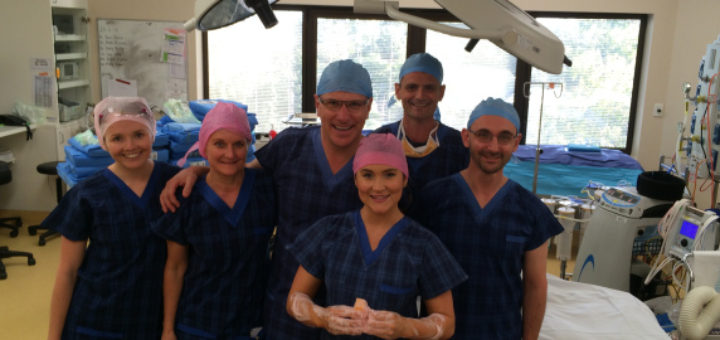How Does an Operating Theatre Work?

Having an operation can be a daunting experience. I have written this post in the hope that reading it will help you feel a little more comfortable should you ever need surgery, and I think you’ll gain a an interesting insight into a world unfamiliar to most. Most people are surprised how many staff there are in an operating theatre and what they all do.
What to Expect
You will be asked to arrive at the hospital having fasted for a certain period of time (usually six hours). You are then guided to a pre-operative area where a nurse assesses you and asks you to put on a hospital gown. Although it’s not the most flattering piece of clothing, it’s designed with your safety in mind.
The Waiting Period
Then you wait, often a long time. It seems very long because you are generally a little anxious. If you’re kept waiting for a while it’s not an indication that the doctors have forgotten about you or are being tardy. Every operation is slightly different so it’s hard to predict exactly how long a procedure takes. Surgeons are meticulous and they take their time and do everything with the greatest amount of care to ensure the best outcomes for their patients.
You can wait with a friend or relative for most of the time. It’s a great idea to bring a book or device to help pass the time.
So This is What an Operating Theatre Looks Like
When you are finally wheeled to theatre on a bed patients are often surprised how many staff there are to care for them. The operating theatre can seem a foreign place with lots of big lights, special equipment and lots of people. Remember that the sterile setting, the equipment and the number of people are all there to keep you safe and ensure the best outcome.
Meeting the Team
Each person plays a critical role. There is often great camaraderie amongst the theatre team as they often spend many hours together and they tend to love their work.
There are usually three doctors:
- The surgeon – who does the operation, this is the doctor your GP referred you to, whom you previously met to discuss your problem and decide if surgery was the best solution (sometimes this isn’t the same surgeon in the public system);
- The assistant surgeon (that’s me);
- The anaesthetist – who has the vital role of putting you to sleep, monitoring you the whole time and safely waking you up.
There will also usually be three nurses:
- The scrub nurse – who participates in the surgery, sets up all the instruments and equipment and basically runs the show;
- The scout nurse – who remains unsterile to open all the sterile instruments, plug in all the equipment, keep a record of the surgery including checking with the scrub nurse that all the instruments are accounted for at the end and open any extra equipment required along the way;
- The anaesthetic nurse or technician – helps the anaesthetist.
There’s also an orderly, who wheeled you in on the bed, helps with all the heavy lifting and patient transfers. Sometimes there is even a representative from a medical company if guidance is required with the use highly specialised equipment or prostheses that they have supplied.
More Staff are Often Required for Complex Procedures
For some procedures, even more staff are required to operate special equipment such as a bypass machine for heart surgery or a cell saver which collects and processes lost blood enabling it to be replaced to the patient.
How Do We Keep an Operation Sterile?
Three people – the surgeon, the assistant surgeon and the scrub nurse participate directly in the surgery and are required to remain sterile. This means they must wash their hands in a certain way (like the scrub nurse in the front of the photo) and must be dressed in sterile garments over their ‘scrubs’ and put on two pairs of sterile gloves. Once ready to start they cannot touch anything that is unsterile. The rest of the team remains unsterile to facilitate the surgery. The site of the surgery is also prepared with an alcohol-based solution.
We Always Double Check
Before you go to sleep you will be asked to identify yourself, who your surgeon is, and what surgery you are having many times.
Meanwhile Your Loved One’s Wait
Your friend or relative often waits for you in a waiting area or perhaps a nearby café. The surgeon will usually call them as soon as the surgery is over to let them know it has all gone well. This feels like a very long wait for them!
What to Expect When You Wake Up
The next thing you know you wake up in the recovery area with a new nurse caring for you – the recovery nurse. This is their speciality area and once you are sufficiently awake, you will be discharged to the ward if you need to stay overnight. If your surgery was more minor you will be allowed to go home in the care of your friend or relative once you are able to eat and drink. You will usually see the surgeon shortly after your surgery or the following day.















